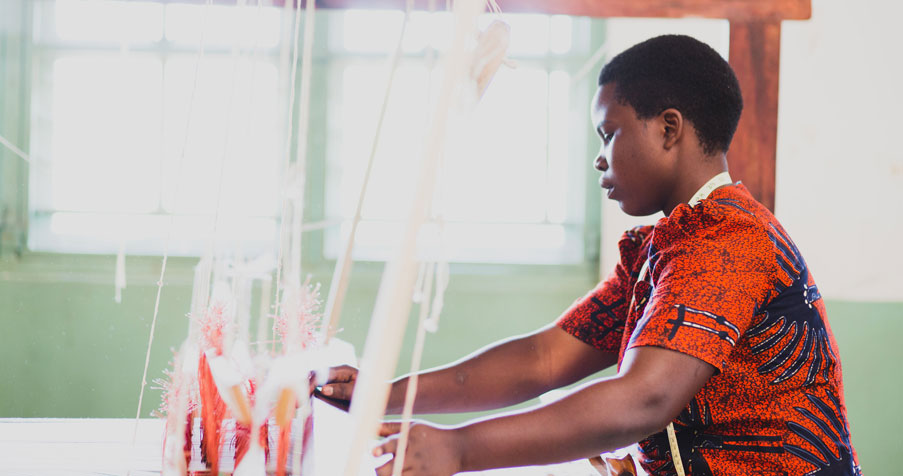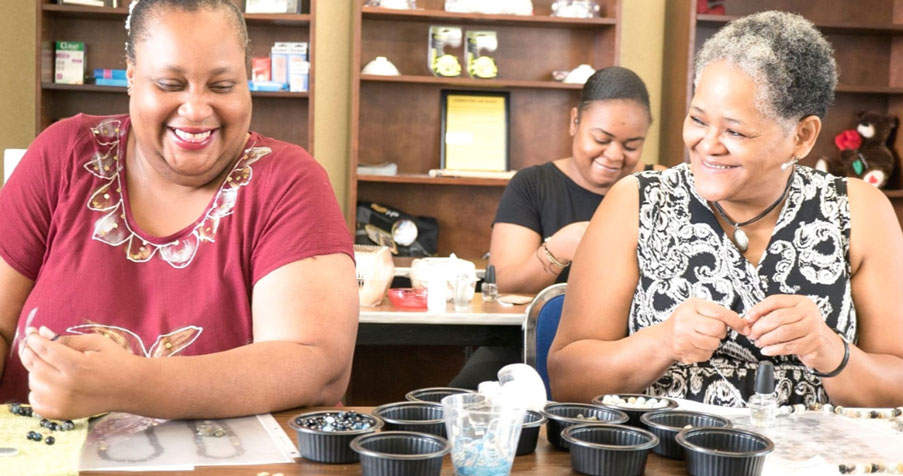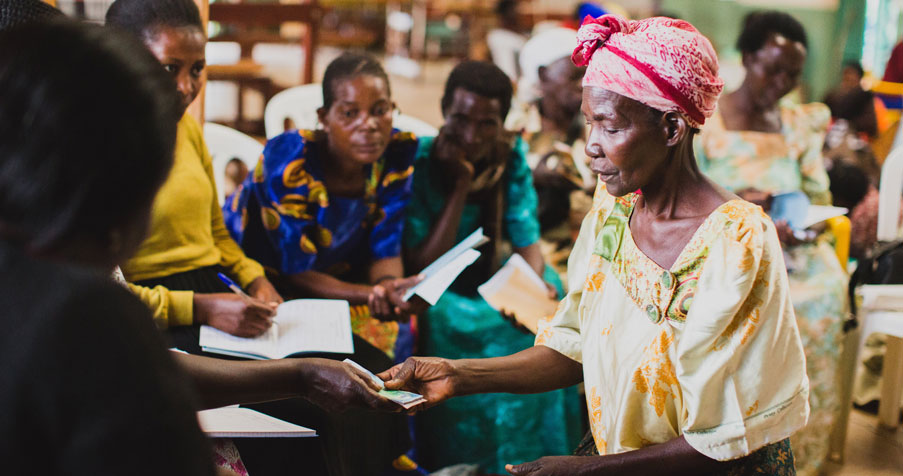Akola connects women on two continents through artisanship and opportunity
Aug 5 2019
In Dallas, Sara began assembling strings of beads crafted in East Africa from dried raffia, horn, and bone. The job was a rare opportunity to earn an income to support her children. After six months of making jewelry alongside women from similar backgrounds, she gathered the confidence to dust off a long-forgotten dream and went on to earn a certificate as a dental hygienist.
On the other side of the world near Jinja, Uganda, a woman named Sarah and others like her who were born into poverty were hired to make beads and charms from local materials. When they started work, they were barely brave enough to make eye contact, but the reward for their artisanship included a renewed sense of self-worth as well as a steady income. Last year, Sarah ran for local office and was elected.
The thread connecting these women is Akola, which gives women in Uganda and Dallas jobs and the opportunity to transform their lives. In rural Uganda, where most people are born into extreme poverty, women marry early and have little power to advocate for themselves; in Dallas, the women Akola employs all join the program as mothers in crisis, struggling to provide for their families. Since its founding in 2006, Akola has provided an income, counseling, and financial literacy tools to more than 580 members who care for more than 4,000 dependents.
“The nature of the Akola’s impact is core to its operations,” says Reed Mayfield, manager of social enterprise lending for RSF Social Finance. “The women Akola employs are the agents of their own change, and Akola gives them the tools. It’s so powerful!”

A catalyst for change
In 2004, Brittany Underwood, a Southern Methodist University student, spent the summer teaching English in a village in Uganda. It was her first encounter with the developing world. There she met Sarah, a woman her age who was caring for 24 street children in her home.
“The moment shook me out of complacency and into action,” says Underwood, Akola’s CEO. She raised money from friends and family to build an orphanage and dig wells in the community, but soon realized that wasn’t enough to heal the core causes of poverty. Two years later, she founded Akola.
“We built a workforce project so that women who take in children could have funds of their own,” says Underwood. “It was about the simplicity of having a dependable income.”
Akola threads deep impact into the supply chain
Akola’s mission is to have the brand’s entire supply chain—from the artisans who craft the beads and charms in Africa to employees in Dallas who assemble, ship, and sell the Akola brand jewelry—benefit women in need.
In Uganda, Akola has provided job training, professional development, and a living wage to over 500 marginalized women, who often open their own small businesses within three to five years. In Dallas, Akola has provided $15-per-hour jobs for nearly 100 women, including single mothers, formerly incarcerated women, and survivors of domestic violence. Most stay with the organization for up to a year.

“We help them go from a season of crisis to a season of stability,” Underwood says. The communities Akola serves in Uganda and the U.S. face familiar obstacles—they are in crisis situations or serve as caretakers for children and elderly relatives—but have different paths out of poverty. The Dallas-based nonprofit Akola Academy helps the women on both continents move forward by providing wraparound services like wellness counseling, financial literacy to help employees manage their income, and job training to further their career.
While helping its employees design successful lives, Akola quickly became a top 10 jewelry brand at Neiman Marcus, its exclusive buyer at the time. The growth spurt presented a new chapter—and challenge—for the young organization.
Flexible, catalytic capital enables healthy growth
In 2017, Neiman Marcus wanted to double its orders, and Underwood secured an account with the Home Shopping Network. Underwood was receiving large purchase orders but struggled to raise equity to finance the boost in production for her nonprofit.
Fortunately, an old college friend, Ross Baird, CEO of Village Capital, introduced her to RSF Social Finance. Akola was a perfect fit for RSF’s Women’s Capital Collaborative (WCC), a gift-money fund that provides diverse forms of catalytic capital to women social entrepreneurs at critical moments. In 2017, the WCC provided the Akola Project with a $250,000 line of credit to give Akola a runway to go after new sales accounts.
“RSF was able to provide flexible capital at the right time—especially as Akola is experiencing growth and seeing so many opportunities to expand their brand, and in turn their impact,” Mayfield says.
Akola used the funds to expand its product line and build inventory ahead of sales while freeing up operating cash. In the fall of 2018, RSF increased its loan amount to $650,000, helping the enterprise move toward a goal of raising $3 million for key hires, business development, and new digital marketing that shares the project’s social impact with customers.
“Since partnering with RSF during the retail expansion, we have been able to grow our team and bring on industry experts and leadership to lead the charge,” Underwood says.
A hybrid approach to deepen impact
Raising capital isn’t Akola’s only challenge. They also want to preserve their mission as they grow.
“There is true enterprise integration in the change they’re making,” Mayfield says. “Selling more products creates more impact for the women in Uganda and Dallas.”

This year the organization evolved to adopt a hybrid business model. The Akola brand became a for-profit public benefit corporation focused on sales, marketing, design, and manufacturing. Akola Academy, a nonprofit, works to provide counseling, financial literacy, and other services to help employees further their careers—and continue to thrive as self-sufficient.
“Being a public benefit corporation protects the mission and allows sales and infrastructure growth,” Underwood says. “The hybrid structure allows us to be capitalized and competitive.”
As a for-profit, Akola can raise money from impact investors as well as take on debt, while the nonprofit can make the most of philanthropic funds.
“Brittany Underwood was adamant that the philanthropic community play an important part in creating impact,” Mayfield says. “RSF is itself a hybrid organization. It’s part of the WCC’s approach, and we are actively looking at using different existing legal structures and models to create impact.”
Beads of hope
Akola has expanded to six retailers in the past eight months, with launches in Nordstrom and Saks Fifth Avenue. Its success continues to allow women to escape poverty, kick-start careers, or become entrepreneurs. The Akola Academy is also launching an alumni program to match former employees in Dallas with career coaches, helping them get retail training and credentials.
With the hybrid organization, Akola’s goal is to distribute $25 million in wages, benefiting over 1,000 women by 2029 (it’s already paid $1 million).
As it works toward this goal, Akola has received grants and loans from programs like the City of Dallas Development Fund and financial institutions like Northern Trust. Meanwhile, RSF continues to provide partnership and give Akola a bridge to the impact community.
“RSF has the stamp of approval of the investing community at large and an inclusive networking community,” Underwood says. “Whether it’s a capital need or a connection with another social enterprise, RSF is an ally.”